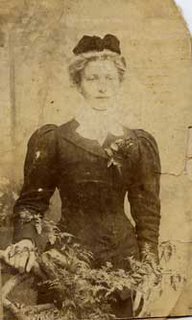 The photograph is of my maternal grandmother, taken when she was just 18. Young ladies (if they exist at all) don't have the same grace and elegance these days, but they do have much more opportunity. My grandmother became a governess at Layer Marney Towers, near Tiptree, Essex.
The photograph is of my maternal grandmother, taken when she was just 18. Young ladies (if they exist at all) don't have the same grace and elegance these days, but they do have much more opportunity. My grandmother became a governess at Layer Marney Towers, near Tiptree, Essex.We moved to Braiswick before the winter of 1947, which was very cold and brought heavy falls of snow. An early memory is of being pushed through a window to help clear snow away from the kitchen door, as we could not get out of the house. To a small mite (I was not yet three) the snow was very deep, and exciting. Hill Bend was a lovely house, a warren of rooms added in an ad-hoc fashion over several centuries. It stood in a large garden that stretched down the side of a hill towards an open field we shared with our neighbours. It was on one side of a valley and from the side gardens we could look across to the Daniels Brewery on the other side at the edge of the village of West Bergholt.
The garden dominated our lives in those days. It had thirty fruit trees, mostly apples, although there was a bullace, a Victoria plum, that rarely provided much fruit and a greengage that was extremely miserly. There were rows of black and red currants, raspberries, logan and gooseberries, and against the fruit shed was a glorious Morello cherry, whose fruit gave us the very best of pies. The garden had a large wooden barn, part coal shed, part garage and a smaller barn we used as a shed and fruit store, it was also the plucking room when we killed chickens. In the winter with a paraffin stove to keep us warm and a hissing Tilley lamp for light it was a cosy place, as we sat on boxes plucking feathers from still-warm chickens. The walls were lined with shelves, upon which were apples, each carefully wrapped in newspaper, each set to become part of my mother’s delicious pies.
Dad used to hand-dig about an acre of heavy clay every year to grow potatoes, partly to feed ourselves but also to add to the food we fed the pigs, chickens and rabbits. All were needed for food. A nightly chore was to boil up the mash for the pigs, throwing in whatever looked edible.
We took in young piglets, fattening them up for twenty or so weeks until they were sent to slaughter. One was returned, butchered; one half fresh the other half smoked or cured. For a few days there was a flurry of cooking and an excess of fresh pork. The remainder was salted and the cured pork hung in a larder where it would last until the next pig arrived.
In between the chickens gave eggs, and eventually themselves. Capons were kept for the winter season and rabbits were taken whenever they were ready. This may seem a basic way of life but we lived like lords compared to many families after the war, most of who had to rely upon supplies of poor quality rationed food from badly stocked shops.
That rationing system, which allocated precise quantities of food and clothing to every person in the country, continued until the 1950s, I still have my mother’s ration book, perhaps I can claim something from the unused coupons?
In our house we had apple pies, roast chickens and pots full of fresh vegetables throughout all those days, when most people were eking out the meagre rations allowed under the rationing system. My mother and father worked tirelessly to ensure that we had enough to eat, that we had proper clothing and kept warm.
Beyond those basic necessities of life we had very little, but not much more was needed. How many possessions do you really need? A woman told me yesterday that she ‘really needed a new bracelet’. She didn’t, she was just programmed to expect that she could have anything she wanted. That’s the price of commercialism, that’s the power of advertising. What’s sad is that governments now rely upon the tax gained from the sale of such trivia. There is another, much better, way of life, one that everyone in the whole could enjoy if we just took a step back and asked ourselves, ‘Do I really need this?’ Most of the time you can do without.
No comments:
Post a Comment